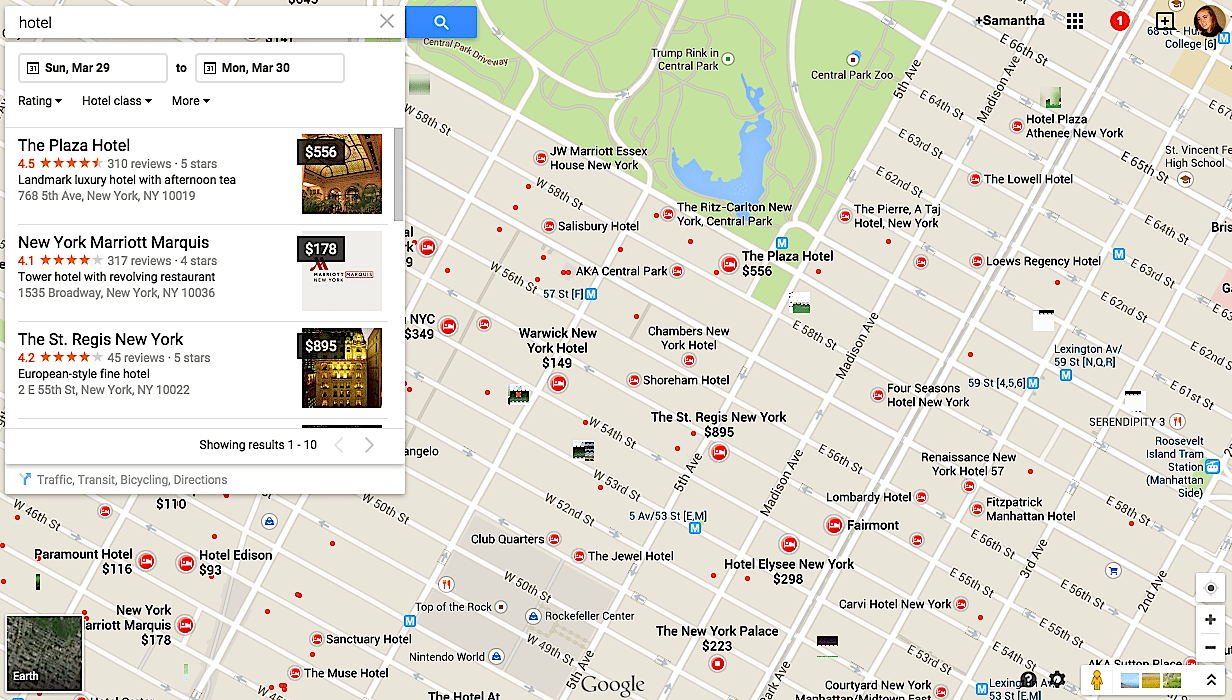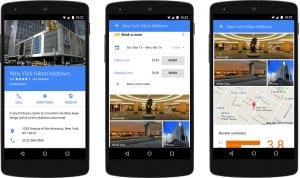Skift Take
Quickly providing Internet bookers with the most relevant hotel information at a lower cost is one step in hotels' continued search for increased direct bookings.
When travelers today are ready to book a hotel, they’re likely to research using a variety of sources, including Google, TripAdvisor reviews, third-party booking sites and apps.
Many of those options, however, are third-party transactions that take revenue away from hotels in comparison to direct bookings.
Google’s Hotel Ads product positions itself as a solution for hotels looking to drive leads and capture — hopefully — direct bookings in an increasingly noisy and multi-layered booking process. Hotel Ads appear in all Google products where travelers could potentially search for a hotel including Search, Maps, and Google+.
Google doesn’t promise that the Hotel Ads will result in a direct booking as users can view multiple prices available directly though the hotel site and third-party providers like Expedia and Priceline.
“Hotel Ads gives hotels the opportunity to connect with consumers where they are booking,” says Megan Danielson, Google’s head of industry for travel.
“The goal is to connect users to a booking channel, to make the travel journey as rich as possible rather than dictate where users are supposed to book.”
Google launched Hotel Ads in 2011, but has since streamlined the navigation and prioritized information including rates, availability, users reviews, descriptions and location. Google has also given hotels the opportunity to vary rates price by property, market, and device.
In an important update, Google also optimized the ads for mobile devices. One of five Hotel Ad referrals come from smartphones, according to Google.
Hilton’s Hotel Ads Experience
This morning Google released a case study looking at Hilton Worldwide’s experience with Hotel Ads.
According to the report, Hilton has seen conversion rates increase by 45 percent and ROI increase by 12 percent when using Hotel Ads in comparison to traditional ads that appear in Google Search.
“It didn’t really surprise us that hotels get better conversion rates with Hotel Ads,” says Geraldine Calpin, global head of digital at Hilton Worldwide.
“It’s a more helpful and detailed ad.”
Conversion rates account for people who click through the ad and complete a booking.
Both conversion and ROI from Hotel Ads are generally in line with what Hilton sees from other metasearch partners like Kayak and Hipmunk, says Calpin.
For Hotel Ads in particular, desktop continues to drive the highest conversion rates. The hotel company has seen the best ROI come through Google’s Maps and Places followed by Search and Hotel Finder.
Despite the ad’s relative effectiveness, integration in search results often comes at the expense of organic search.
“We would always prefer the user find us through our organic listing as opposed to a paid placement integrated into the search results page,” she says.
Hilton will generally test these digital ad products with a sample of hotels across different locations and price points. Once it has established best practices for that particular product, Hilton will roll it out to others. All 4,250 Hilton properties currently advertise via Hotel Ads.
Talking about broader ad strategies, Calpin says that retargeting has proven to be one of the most effective methods of digital advertising. Also, hotels that provide interior photos via Google Maps Business View capture much higher engagement than those without photos.
The Daily Newsletter
Our daily coverage of the global travel industry. Written by editors and analysts from across Skift’s brands.
Have a confidential tip for Skift? Get in touch
Photo credit: Hotel Ads appear in Google Search.

